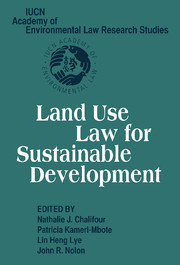Book contents
- Frontmatter
- Contents
- List of Contributors
- Message from Kofi A. Annan, Secretary-General, United Nations
- Foreword by Charles Odidi Okidi and Nicholas Adams Robinson
- Acknowledgments
- Introduction
- Challenges of Environmental Law – Environmental Issues and Their Implications to Jurisprudence
- ONE INTERNATIONAL ISSUES AND LEGAL RESPONSES TO SUSTAINABLE LAND MANAGEMENT
- 1 Is Conservation a Viable Land Usage? Issues Surrounding the Sale of Ivory by Southern African Countries
- 2 Climate Change and Land Use in Africa
- 3 Climate Change Adaptation and Mitigation: Exploring the Role of Land Reforms in Africa
- 4 The Integration of Landscape into Land Use Planning Policy in Relation to the New European Landscape Convention
- 5 EIA Legislation and the Importance of Transboundary Application
- TWO NATIONAL APPROACHES TO LAND USE PLANNING FOR SUSTAINABLE DEVELOPMENT
- Index
1 - Is Conservation a Viable Land Usage? Issues Surrounding the Sale of Ivory by Southern African Countries
Published online by Cambridge University Press: 17 August 2009
- Frontmatter
- Contents
- List of Contributors
- Message from Kofi A. Annan, Secretary-General, United Nations
- Foreword by Charles Odidi Okidi and Nicholas Adams Robinson
- Acknowledgments
- Introduction
- Challenges of Environmental Law – Environmental Issues and Their Implications to Jurisprudence
- ONE INTERNATIONAL ISSUES AND LEGAL RESPONSES TO SUSTAINABLE LAND MANAGEMENT
- 1 Is Conservation a Viable Land Usage? Issues Surrounding the Sale of Ivory by Southern African Countries
- 2 Climate Change and Land Use in Africa
- 3 Climate Change Adaptation and Mitigation: Exploring the Role of Land Reforms in Africa
- 4 The Integration of Landscape into Land Use Planning Policy in Relation to the New European Landscape Convention
- 5 EIA Legislation and the Importance of Transboundary Application
- TWO NATIONAL APPROACHES TO LAND USE PLANNING FOR SUSTAINABLE DEVELOPMENT
- Index
Summary
THE SYMBOL AND THE REALITY
The African elephant is a potent symbol of and for conservation efforts worldwide. However, the true value of wild animal species must be considered not as abstract symbols, but as essential components of their ecosystems. The elephant has been described as a “superkeystone” species. It is truly the landscape architect of the African bush and many physical and biological aspects of its habitat are dependent on its continued presence.
The argument goes even further. In Africa, animals have formed an integral part of the landscape. The res nullius of Roman Law finds an interesting expression in the law of property as it is applied in most African legal systems. Traditionally, neither land nor animals are capable of private ownership. Colonial systems of government and the laws that came with them changed this. No Eurasian system of land ownership has been successfully applied in Africa, except to the detriment of Africans. Refinements of the Eurasian- or European-influenced status quo probably would not go far enough in addressing questions of intra- and intergenerational equity – deeper reform is needed. Terms like investment and ecotourism have the ugly connotation of new colonialism, because new boundaries are created between the land and its people. Elephants are the gentle giants of the planet. Africa is the antithesis of the gentle giant, but it has the potential to represent a new order of coexistence of myriad cultures. Land represents a more complex emotional theme.
- Type
- Chapter
- Information
- Land Use Law for Sustainable Development , pp. 27 - 44Publisher: Cambridge University PressPrint publication year: 2006



